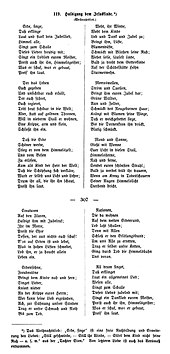Erde, singe
| "Erde, singe" | |
|---|---|
| German Christmas carol | |
 Melody, with text "Still geschwinde", in the second edition, Cologne, 1755 | |
| English | "Earth, Sing" |
| Written | 1837 |
| Text | by Johannes Geissel |
| Language | German |

"Erde, singe" ("Earth, sing") is a German Catholic hymn with a text by Johannes Cardinal of Geissel, Archbishop of Cologne, written in 1837 as a Christmas carol in ten stanzas. The current Catholic hymnal Gotteslob has only four stanzas as GL 411, which are in the general section of praise.
History[]
Johannes Geissel wrote the lyrics in 1837 as a Christmas carol in ten stanzas.[1][2]
In a version printed version of 1969, the song is called a paraphrase and expansion ("Nachbildung und Erweiterung") of a different song, "Still geschwinde, — Still ihr Winde, — Stört dem Kind nicht seine Ruh" from the collection Tochter Sion, a hymnal for use at church and at home, published by in 1741 in Cologne. The song "Still geschwinde" is titled "Die Hirten singen dem schlafenden Heilande" (The shepherds sing for the sleeping Saviour), a pastoral lullaby in a triple metre.[3] The same melody was used also for "Erde, singe" and is the current melody, with only slight changes reducing ornaments and melismas.[citation needed]
When the German Catholic hymnal Gotteslob was compiled in 1975, the song was not chosen for the common section (Stammteil), but was part of most regional sections. In the current Gotteslob of 2013, it appears in the common section, but in only four stanzas, and as GL 411, which is in the general section of praise, not noticeably related to Christmas.[4]
Content[]
Geissel used only some elements from the eight stanzas of the model "Still geschwinde", in which wind, snow and rain are called to silence in order to not disturb the slumber of the baby. Being created by God, the natural forces have to obey, and praise by becoming silent.[3]
This idea of praise by all creation is the main theme of Geissel from the beginning. All creatures are not called to silence, but to loud praise of the incarnation in singing and rejoicing. Several of the ten stanzas anticipate the Passion of Jesus, but only one of these (No. 9) became part of the current version (No. 3). It is the only one of the four current stanzas with an allusion to Christmas: "Um uns alle zu erretten, trug er selber unsre Ketten" (To rescue us all, he himself carried our chains), while the others focus of the praise of all creatures. The song is listed in the section Lob, Dank und Anbetung (Praise, thanks, and adoration).[4] Several regions use it for Thanksgiving (Erntedankfest).[5][6]
Text[]
The text is from the shortened version in the current Gotteslob.
|
German current lyrics Erde, singe, |
Verse translation Earth, go singing, |
Melody[]

Colin Mawby created a setting for mixed four-part choir with organ ad libitum in 2012.[7]
References[]
- ^ #119 In Johannes von Geissel's Schriften und Reden (Cologne, 1869) (of all hymns and poems): "Composed in the years 1835, 1836 and 1837"
- ^ "Erde singe, dass es klinge". evangeliums.net (in German). Retrieved 4 January 2017.
- ^ Jump up to: a b Still geschwinde, Melodie mit beziffertem Bass und vollständiger Text (1755)
- ^ Jump up to: a b "Erde, singe, dass es klinge (L) / Leben in Gott – Lob, Dank und Anbetung". mein-gotteslob.de (in German). Retrieved 4 January 2017.
- ^ "Flurprozession über den Birka hat in Grafenwöhr eine lange Tradition". onetz.net (in German). Retrieved 4 January 2017.
- ^ "Schöne Feierstunde zum Erntedankfest". mittelbayerische.de (in German). Retrieved 4 January 2017.
- ^ "Colin Mawby / Erde, singe, dass es klinge" (in German). Carus-Verlag. Retrieved 4 January 2017.
External links[]
| Wikimedia Commons has media related to Erde, singe. |
- GGB 411: Erde, singe, dass es klinge on YouTube
- Erde singe, dass es klinge / Gotteslob 411 pueri-cantores.info
- German-language Christmas carols
- Catholic hymns in German
- 19th-century hymns in German
- 1837 songs